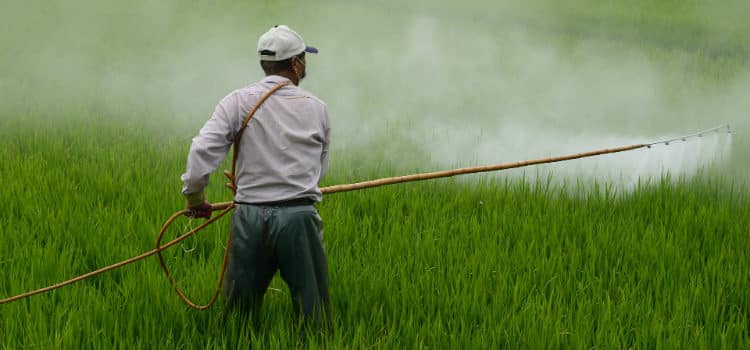The world’s most widely-used herbicide has been linked to non-Hodgkin’s lymphoma. A group of leading cancer experts say glyphosate, the active ingredient in Monsanto’s Roundup, increases the risk for cancer.
Thousands of people who were exposed to Roundup and developed non-Hodgkin’s lymphoma may be able to pursue compensation. Call our experienced lawyers today for a free consultation.
Did you see a television commercial informing non-Hodgkin’s lymphoma patients of a growing litigation around the popular herbicide Roundup?
A number of law firms have begun producing these ads, which usually run during local broadcasts, to notify farmers, landscapers, nursery workers, and home gardeners that Roundup has been linked to an increased risk of cancer. Many of these commercials mention glyphosate, the chemical substance that acts as Roundup’s active ingredient.
Several ads also note that Roundup is manufactured by Monsanto, the world’s largest agrochemical company. Most of the TV ads conclude by saying that hundreds of non-Hodgkin’s lymphoma patients and families have already filed Roundup lawsuits against Monsanto, accusing the business giant of concealing glyphosate’s link to cancer for decades.

Our experienced product liability attorneys don’t produce television commercials, but we are committed to providing the public with the most up-to-date information on important litigations in the United States. Today, between 800 and 1,000 Roundup lawsuits have been filed, all involving some form of non-Hodgkin’s lymphoma.
Most plaintiffs claim to have worked around Monsanto-produced glyphosate herbicides for years; many farmers have been using the product for decades. Then, lawsuits continue, came a devastating diagnosis of non-Hodgkin’s lymphoma, along with all the rigorous treatments that accompany cancer. Alongside these individual plaintiffs stand hundreds of grieving families who say their loved ones lost a long battle to Roundup-associated lymphoma.
The plaintiffs, many of whom only learned about filing a lawsuit after watching a TV commercial, were shocked to learn that Roundup’s active ingredient, a chemical called glyphosate, has been linked to cancer for years. Even more shocking, the International Agency for Research on Cancer, one of the world’s leading cancer research organizations, has found that glyphosate is a “probable” carcinogen in humans.
This group, an arm of the World Health Organization, says that scientific evidence is particularly strong around the subject of non-Hodgkin’s lymphoma, a form of blood cancer in which immune system cells become malignant.
Numerous medical experts have come out in support of the International Agency for Research on Cancer. A former director of the Centers for Disease Control and Prevention says it’s “nonsense” to deny that glyphosate is a probable human carcinogen.
A number of countries, including France, Columbia and Sri Lanka, have already limited or ended the sale of glyphosate-based herbicides. Despite a wealth of medical evidence, Monsanto continues to deny that glyphosate is a causal factor in many lymphoma cases. In fact, plaintiffs accuse the global agrochemical manufacturer of manipulating the Environmental Protection Agency to downplay the current state of scientific research.
Many of the Roundup lawsuits have been consolidated in the US District Court for the Northern District of California. In San Francisco, over 260 product liability lawsuits are making their way through pre-trial proceedings as a group.
Once all the evidence has been gathered, and both sides have developed their arguments, District Judge Vince Chhabria, picked to preside over this Multi-District Litigation, has selected a number of representative lawsuits for trial. The first of these trials is scheduled to begin on June 18, 2018. These “bellwether trials” will help to inform settlement negotiations.
If plaintiffs prevail in a number of trials, Monsanto could decide to settle all of the lawsuits in one go, rather than fight against each one in court. Defense verdicts, on the other hand, could signal that defending against the cases vigorously may be the right move. Again, no bellwether trials have been held yet and to speculate further would be unwise.
Outside of California, hundreds of other Roundup lawsuits are pending in state courts in Missouri and Delaware.
All of these Roundup litigations are moving fast, but there’s still time for patients and families to file their own lawsuits. In principle, any person who was repeatedly exposed to Roundup and was then diagnosed with non-Hodgkin’s lymphoma may be eligible to file suit against Monsanto. Significant financial compensation may be available.
Many non-Hodgkin’s lymphoma patients say their disease has led to astronomical medical expenses, lost work, excruciating pain and deep emotional suffering. All of these damages can, in theory, be compensated in a product liability lawsuit.
Families who lost loved ones to non-Hodgkin’s lymphoma may be able to file a wrongful death lawsuit, pursuing compensation for funeral expenses, lost financial support, and, in some states, emotional trauma.
To learn more about your legal options, contact our experienced lawyers today. We’re offering free consultations to any patient or family member who believes they may have a case against Monsanto. If you or a loved one developed non-Hodgkin’s lymphoma after being exposed to Roundup, call us today to find more information about case eligibility at no charge.
 info@legalherald.com
info@legalherald.com